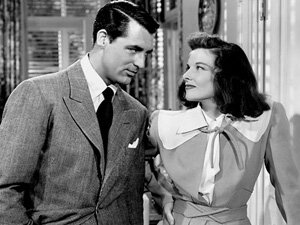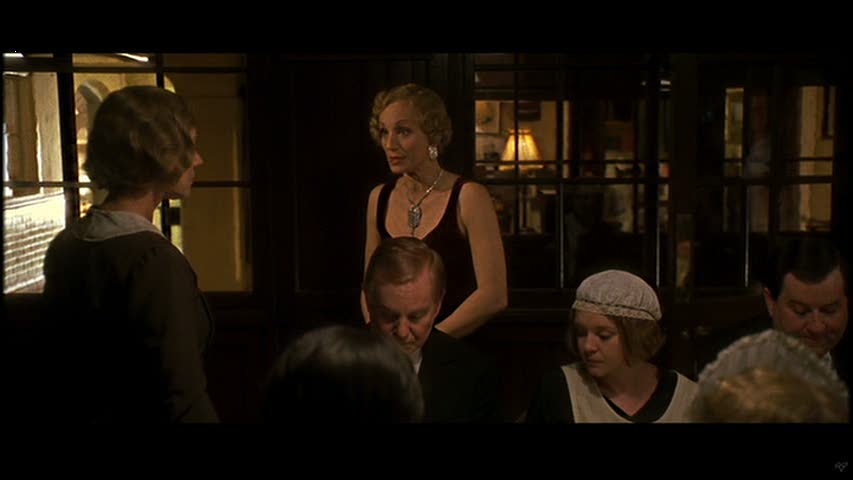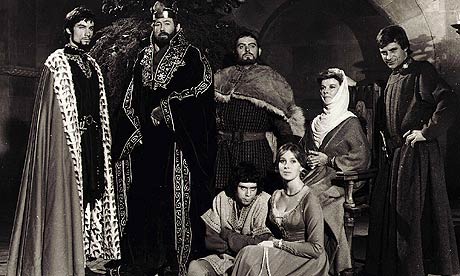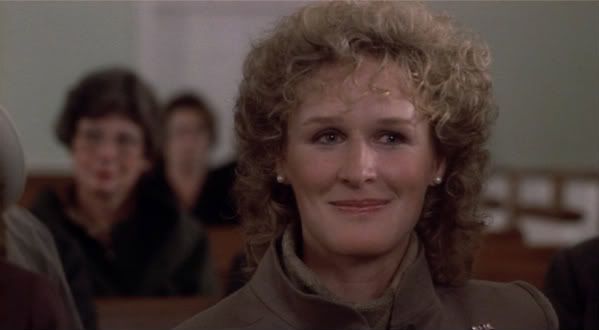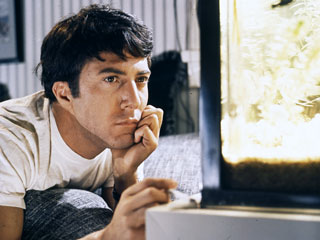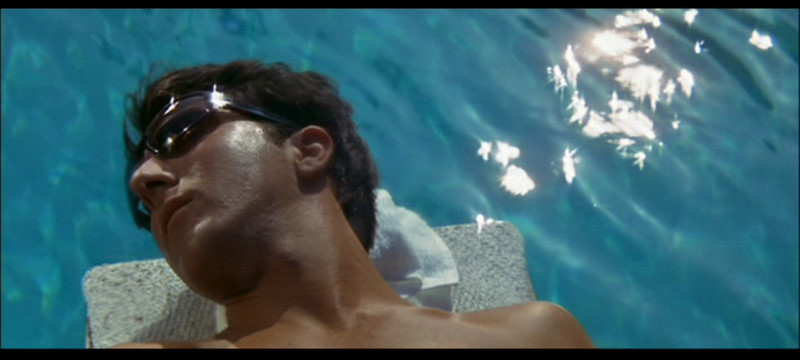So, the marathon ends and with it comes my gift to you, which is about as selfish as I can get – review of my favourite film. It functions as a gift, though, an incredibly late one – but alas. C’est la vie.
Despite its massive running time (the film covers about two and a half hours) The English Patient is the type of film where every line and moment seems like a potential pivotal revelation. In a near confrontation with Willem Dafoe’s Caravaggio Juliette Binoche’s nurse tearfully explains that her patient is in love with ghosts. It doesn’t stand out as expressly revelatory because the film, a well-timed dance between the past and present, depends on memory. Yet, even though it is the memories of Almasy which acts as the foundation on which the film lays the entire film is about the characters and their ghosts. Some are moving forward, some are stuck in transit – but they’ve all got their mind on the ghosts in their past.
For the longest while, whenever someone asked me to name my favourite film – the first thing that flashed through my head were those images of the sandy desert and the mysterious caves. For, despite the many stories, and the overlapping themes – that is what The English Patient begins and ends with….endless sand…The English Patient is, after all, a story about the war even though it never goes directly to the front like Saving Private Ryan. It is one story divided in two. The prologue is in the desert – Count Almasy’s International Sand Club, and the epilogue is in Italy, that of the eponymous patient, his nurse – Hana and her Sikh lover and the film cleverly opens with the plane crash in the air which unites the two – prologue and epilogue – to make a glorious whole.
 The English Patient depends on Ralph Fiennes to be the centre of the story. It is his story afterwards. The Count seems to be the role that fits him perfectly – a coldness that is not apathy but just stillness. He spends half of the film in extensive makeup existing as his extensive burns, and yet he never plays the Patient as a victim. Fiennes has always been an extensively subtle actor (sometimes misconstrued as blandness) and thus, the role of Almasy fits him like a glove. We see him raise his voice only twice – the first time at a drunken dinner, the second after a fateful run-in with some soldiers. It’s this very sereneness that draws Katherine to him. Her first words to him are, “I wanted to meet the man who could write such a long paper with so few adjectives.” He’s so obviously disconcerted by being under scrutiny, and he winces almost imperceptibly. Then he replies, “A thing is still a thing, no matter what you put in front of it. Fast car, slow car, chauffer driven car…still a car.” Katherine’s combative argument? “Love. Romantic love, filial love, platonic love. Quite different things, surely?” We’re being given clues this early on; it’s Almasay’s inability to distinguish between things which becomes the cause of his undoing, and for Katherine it’s her over attention to detail which becomes hers.
The English Patient depends on Ralph Fiennes to be the centre of the story. It is his story afterwards. The Count seems to be the role that fits him perfectly – a coldness that is not apathy but just stillness. He spends half of the film in extensive makeup existing as his extensive burns, and yet he never plays the Patient as a victim. Fiennes has always been an extensively subtle actor (sometimes misconstrued as blandness) and thus, the role of Almasy fits him like a glove. We see him raise his voice only twice – the first time at a drunken dinner, the second after a fateful run-in with some soldiers. It’s this very sereneness that draws Katherine to him. Her first words to him are, “I wanted to meet the man who could write such a long paper with so few adjectives.” He’s so obviously disconcerted by being under scrutiny, and he winces almost imperceptibly. Then he replies, “A thing is still a thing, no matter what you put in front of it. Fast car, slow car, chauffer driven car…still a car.” Katherine’s combative argument? “Love. Romantic love, filial love, platonic love. Quite different things, surely?” We’re being given clues this early on; it’s Almasay’s inability to distinguish between things which becomes the cause of his undoing, and for Katherine it’s her over attention to detail which becomes hers.
 It’s an expansive cast, and I’m especially partial to Juliette Binoche (one of my two favourite supporting actress winners) but a significant portion of the film depends on the rapport between Kristin Scott Thomas and Ralph Fiennes. They both exude that, somewhat trite, stiff upper lip that comes to be considered akin with Britons. I’m susceptible to the british, most of you know that, but that’s not why I think that Katherine Clifton and Laszlo de Almasy are encapsulation of Scott Thomas and Fiennes at their best. They evoke a quiet tenderness that immediately zeroes in on the profundity of this relationship, even before it begins. There’s a beautiful scene where the two are trapped in a vehicle during a sandstorm. Almasy doesn’t whisper sweet nothings in her ears, instead he’s telling her about African meteorology. But the moment is marked by a softness that you feel like you can reach out and touch; and in one of the film’s most understatedly beautiful and devastating moments Katharine reaches out to the paint on the window as we segue into the patient’s face and it’s almost as if she’s reaching across time. That’s how powerful their relationship seems, that’s how real the images evoked seem.
It’s an expansive cast, and I’m especially partial to Juliette Binoche (one of my two favourite supporting actress winners) but a significant portion of the film depends on the rapport between Kristin Scott Thomas and Ralph Fiennes. They both exude that, somewhat trite, stiff upper lip that comes to be considered akin with Britons. I’m susceptible to the british, most of you know that, but that’s not why I think that Katherine Clifton and Laszlo de Almasy are encapsulation of Scott Thomas and Fiennes at their best. They evoke a quiet tenderness that immediately zeroes in on the profundity of this relationship, even before it begins. There’s a beautiful scene where the two are trapped in a vehicle during a sandstorm. Almasy doesn’t whisper sweet nothings in her ears, instead he’s telling her about African meteorology. But the moment is marked by a softness that you feel like you can reach out and touch; and in one of the film’s most understatedly beautiful and devastating moments Katharine reaches out to the paint on the window as we segue into the patient’s face and it’s almost as if she’s reaching across time. That’s how powerful their relationship seems, that’s how real the images evoked seem.
There’s something incredibly tactile about the production of The English Patient. I’m wary of using a word like masterpiece, because I know that I’m hardly the least nepotistic critic – I have an agenda here, after all. But, it’s important for that illusion of the film’s setting seeming corporeal because the grief that bounds the characters together must seem as palpable. It’s anyone’s guess why the concept of love stories have become so reviled, but The English Patient is a love story although the kind of love is debatable. Just as Katherine ruminates on the aspects of love so the film depends on moments of affection – sometimes lost in pain. There’s so much delicacy with the way in which Juliette Binoche plays Hana as almost a revelatory open person but she’s carrying those battle scars with her. Her act of caring for the wounded is only a way to eschew her own troubles. There’s almost franticness evident in the way she plays hopscotch alone or chops off her hair without even paying attention. The sweetness of that first meeting with Kip (Naveen Andrews is perfect here), which is easily one of the film’s most natural moments, conceals the desperation in this woman who literally laughs at the promise of death.
 Maybe I love The English Patient so much because it’s saturated with subtext upon subtext. It is a story of love, but it is also a story of war. “It’s a war, when it’s a war where you are becomes important” – it’s another of those lines that’s easily ignored but if anything it’s one of the biggest clues as to the Patient’s countenance when he replies, “I hate that.” Minghella is often accused of pushing his agendas through film, and perhaps it’s not absent here since the film closes with Katherine’s lovely We are the real countries not the boundaries drawn on maps monologue. The idiosyncrasies of the characters are what makes them perfect for each other, and unable to exist in unison. Minghella (he writes the screenplay as well as directs it) is careful to not paint any party as villainous. Even as Katharine and Almasy luxuriate in their romance, her husband waits in the car for a forgotten anniversary dinner. Everything shifts when you put it into different perspective so that the ostensible importance of “world affairs” seems skewed. It’s why I have faith in Minghella’s sincerity. “Betrayals in war are childlike compared with betrayals during peace. New lovers are nervous and tender but smash everything, for the heart is an organ of fire.”
Maybe I love The English Patient so much because it’s saturated with subtext upon subtext. It is a story of love, but it is also a story of war. “It’s a war, when it’s a war where you are becomes important” – it’s another of those lines that’s easily ignored but if anything it’s one of the biggest clues as to the Patient’s countenance when he replies, “I hate that.” Minghella is often accused of pushing his agendas through film, and perhaps it’s not absent here since the film closes with Katherine’s lovely We are the real countries not the boundaries drawn on maps monologue. The idiosyncrasies of the characters are what makes them perfect for each other, and unable to exist in unison. Minghella (he writes the screenplay as well as directs it) is careful to not paint any party as villainous. Even as Katharine and Almasy luxuriate in their romance, her husband waits in the car for a forgotten anniversary dinner. Everything shifts when you put it into different perspective so that the ostensible importance of “world affairs” seems skewed. It’s why I have faith in Minghella’s sincerity. “Betrayals in war are childlike compared with betrayals during peace. New lovers are nervous and tender but smash everything, for the heart is an organ of fire.”
So true, and so beautiful.
 The English Patient depends on Ralph Fiennes to be the centre of the story. It is his story afterwards. The Count seems to be the role that fits him perfectly – a coldness that is not apathy but just stillness. He spends half of the film in extensive makeup existing as his extensive burns, and yet he never plays the Patient as a victim. Fiennes has always been an extensively subtle actor (sometimes misconstrued as blandness) and thus, the role of Almasy fits him like a glove. We see him raise his voice only twice – the first time at a drunken dinner, the second after a fateful run-in with some soldiers. It’s this very sereneness that draws Katherine to him. Her first words to him are, “I wanted to meet the man who could write such a long paper with so few adjectives.” He’s so obviously disconcerted by being under scrutiny, and he winces almost imperceptibly. Then he replies, “A thing is still a thing, no matter what you put in front of it. Fast car, slow car, chauffer driven car…still a car.” Katherine’s combative argument? “Love. Romantic love, filial love, platonic love. Quite different things, surely?” We’re being given clues this early on; it’s Almasay’s inability to distinguish between things which becomes the cause of his undoing, and for Katherine it’s her over attention to detail which becomes hers.
The English Patient depends on Ralph Fiennes to be the centre of the story. It is his story afterwards. The Count seems to be the role that fits him perfectly – a coldness that is not apathy but just stillness. He spends half of the film in extensive makeup existing as his extensive burns, and yet he never plays the Patient as a victim. Fiennes has always been an extensively subtle actor (sometimes misconstrued as blandness) and thus, the role of Almasy fits him like a glove. We see him raise his voice only twice – the first time at a drunken dinner, the second after a fateful run-in with some soldiers. It’s this very sereneness that draws Katherine to him. Her first words to him are, “I wanted to meet the man who could write such a long paper with so few adjectives.” He’s so obviously disconcerted by being under scrutiny, and he winces almost imperceptibly. Then he replies, “A thing is still a thing, no matter what you put in front of it. Fast car, slow car, chauffer driven car…still a car.” Katherine’s combative argument? “Love. Romantic love, filial love, platonic love. Quite different things, surely?” We’re being given clues this early on; it’s Almasay’s inability to distinguish between things which becomes the cause of his undoing, and for Katherine it’s her over attention to detail which becomes hers.  It’s an expansive cast, and I’m especially partial to Juliette Binoche (one of my two favourite supporting actress winners) but a significant portion of the film depends on the rapport between Kristin Scott Thomas and Ralph Fiennes. They both exude that, somewhat trite, stiff upper lip that comes to be considered akin with Britons. I’m susceptible to the british, most of you know that, but that’s not why I think that Katherine Clifton and Laszlo de Almasy are encapsulation of Scott Thomas and Fiennes at their best. They evoke a quiet tenderness that immediately zeroes in on the profundity of this relationship, even before it begins. There’s a beautiful scene where the two are trapped in a vehicle during a sandstorm. Almasy doesn’t whisper sweet nothings in her ears, instead he’s telling her about African meteorology. But the moment is marked by a softness that you feel like you can reach out and touch; and in one of the film’s most understatedly beautiful and devastating moments Katharine reaches out to the paint on the window as we segue into the patient’s face and it’s almost as if she’s reaching across time. That’s how powerful their relationship seems, that’s how real the images evoked seem.
It’s an expansive cast, and I’m especially partial to Juliette Binoche (one of my two favourite supporting actress winners) but a significant portion of the film depends on the rapport between Kristin Scott Thomas and Ralph Fiennes. They both exude that, somewhat trite, stiff upper lip that comes to be considered akin with Britons. I’m susceptible to the british, most of you know that, but that’s not why I think that Katherine Clifton and Laszlo de Almasy are encapsulation of Scott Thomas and Fiennes at their best. They evoke a quiet tenderness that immediately zeroes in on the profundity of this relationship, even before it begins. There’s a beautiful scene where the two are trapped in a vehicle during a sandstorm. Almasy doesn’t whisper sweet nothings in her ears, instead he’s telling her about African meteorology. But the moment is marked by a softness that you feel like you can reach out and touch; and in one of the film’s most understatedly beautiful and devastating moments Katharine reaches out to the paint on the window as we segue into the patient’s face and it’s almost as if she’s reaching across time. That’s how powerful their relationship seems, that’s how real the images evoked seem.There’s something incredibly tactile about the production of The English Patient. I’m wary of using a word like masterpiece, because I know that I’m hardly the least nepotistic critic – I have an agenda here, after all. But, it’s important for that illusion of the film’s setting seeming corporeal because the grief that bounds the characters together must seem as palpable. It’s anyone’s guess why the concept of love stories have become so reviled, but The English Patient is a love story although the kind of love is debatable. Just as Katherine ruminates on the aspects of love so the film depends on moments of affection – sometimes lost in pain. There’s so much delicacy with the way in which Juliette Binoche plays Hana as almost a revelatory open person but she’s carrying those battle scars with her. Her act of caring for the wounded is only a way to eschew her own troubles. There’s almost franticness evident in the way she plays hopscotch alone or chops off her hair without even paying attention. The sweetness of that first meeting with Kip (Naveen Andrews is perfect here), which is easily one of the film’s most natural moments, conceals the desperation in this woman who literally laughs at the promise of death.
 Maybe I love The English Patient so much because it’s saturated with subtext upon subtext. It is a story of love, but it is also a story of war. “It’s a war, when it’s a war where you are becomes important” – it’s another of those lines that’s easily ignored but if anything it’s one of the biggest clues as to the Patient’s countenance when he replies, “I hate that.” Minghella is often accused of pushing his agendas through film, and perhaps it’s not absent here since the film closes with Katherine’s lovely We are the real countries not the boundaries drawn on maps monologue. The idiosyncrasies of the characters are what makes them perfect for each other, and unable to exist in unison. Minghella (he writes the screenplay as well as directs it) is careful to not paint any party as villainous. Even as Katharine and Almasy luxuriate in their romance, her husband waits in the car for a forgotten anniversary dinner. Everything shifts when you put it into different perspective so that the ostensible importance of “world affairs” seems skewed. It’s why I have faith in Minghella’s sincerity. “Betrayals in war are childlike compared with betrayals during peace. New lovers are nervous and tender but smash everything, for the heart is an organ of fire.”
Maybe I love The English Patient so much because it’s saturated with subtext upon subtext. It is a story of love, but it is also a story of war. “It’s a war, when it’s a war where you are becomes important” – it’s another of those lines that’s easily ignored but if anything it’s one of the biggest clues as to the Patient’s countenance when he replies, “I hate that.” Minghella is often accused of pushing his agendas through film, and perhaps it’s not absent here since the film closes with Katherine’s lovely We are the real countries not the boundaries drawn on maps monologue. The idiosyncrasies of the characters are what makes them perfect for each other, and unable to exist in unison. Minghella (he writes the screenplay as well as directs it) is careful to not paint any party as villainous. Even as Katharine and Almasy luxuriate in their romance, her husband waits in the car for a forgotten anniversary dinner. Everything shifts when you put it into different perspective so that the ostensible importance of “world affairs” seems skewed. It’s why I have faith in Minghella’s sincerity. “Betrayals in war are childlike compared with betrayals during peace. New lovers are nervous and tender but smash everything, for the heart is an organ of fire.”So true, and so beautiful.














